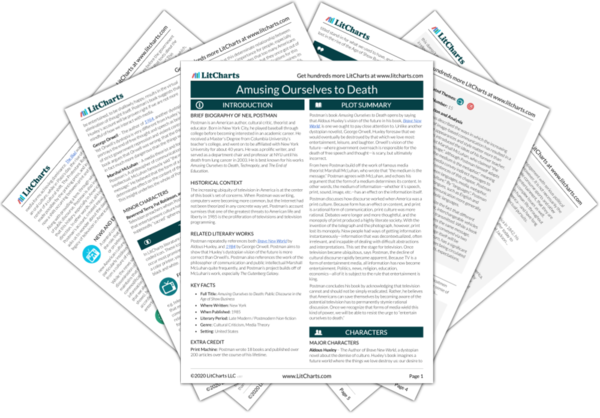Much of the book’s argument takes the form of a historical account that tracks the development of public discourse over time. Postman’s historical account is actually quite vast in scope: The Iliad, Plato, Jesus, the Protestant Reformation, and American history from its colonization to the present are all included in the story Postman tells about the history of media and their effects on culture. His argument essentially articulates how, in many ways, the history of public discourse is the history of different media forms achieving dominance. The Iliad was the product of an oral culture, while in Plato’s day, the rise of writing was at the center of a cultural shift. The Protestant Reformation was then made possible by the printing press, and in America, there is now a shift occurring between print and image.
Along with providing a lens through which to view the history of public discourse, Postman is also invested in demonstrating that this history, especially in America, is headed in a certain direction. In other words, not all kind of discourse are, in Postman’s account, created equal. His historical account then asks us to wonder about the damage potentially caused by the legacy of television in American history.
The History of Public Discourse and Media ThemeTracker

The History of Public Discourse and Media Quotes in Amusing Ourselves to Death
Our languages are our media. Our media are our metaphors. Our metaphors create the content of our culture.

Unlock explanations and citation info for this and every other Amusing Ourselves to Death quote.
Plus so much more...
Get LitCharts A+Like the fish who survive a toxic river and the boatmen who sail on it, there still dwell among us those whose sense of things is largely influenced by older and clearer waters…
The only communication event that could produce such collective attention in today's America is the Superbowl.
When Charles Dickens visited America in 1842, his reception equaled the adulation we offer today to television stars, quarter- backs, and Michael Jackson…
The use of language as a means of complex argument was an important, pleasurable and common form of discourse in almost every public arena…
The telegraph made a three-pronged attack on typography's definition of discourse, introducing on a large scale irrelevance, impotence, and incoherence.
To the telegraph, intelligence meant knowing of lots of things, not knowing about them…
At the end, one could only applaud those performances, which is what a good television program always aims to achieve; that is to say, applause, not reflection.
Americans are the best entertained and quite likely the least well-informed people in the Western world.
The television commercial is not at all about the character of products to be consumed. It is about the character of the consumers of products.
We now know that "Sesame Street" encourages children to love school only if school is like "Sesame Street."











